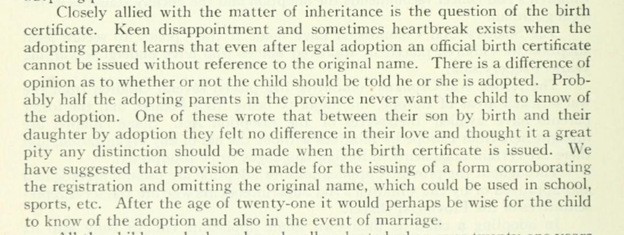Secret Mercer Babies
Are you adopted and researching whether you may be a Mercer baby? Have you wondered whether your deceased adopted parent, or grandparent may be a Mercer baby? Are you a descendant of a deceased Mercer mom and want to know what happened to her children? If so, the following may be helpful to you.
This history is complex as the birth history of some babies born of Mercer mothers has been obscured, making the discovery of their true histories difficult. As outlined in more detail below, the address of the Mercer Reformatory was removed from a vast number of babies’ original birth certificates. In some cases, the Mercer has been redacted or omitted from Children’s Aid Society records requested by adoptees or their descendants. The administrators of the Mercer alleged that removing the connection to the Mercer on babies’ birth certificates ‘protected’ these children from the stigma of having an incarcerated mother. This has resulted in significant challenges for adoptees and their descendants trying to learn about their origins and histories as the records are inaccurate having removed the true circumstances of their births. The sections below offer more detail on how these choices were made. It also identifies who is, and who is not, entitled to explore the hidden histories and request Mercer Reformatory records.
Motherhood Incarcerated
On Feb, 1, 1881, shortly after the institution opened, City News announced the first known birth that took place at Mercer Reformatory.
Early Mercer annual reports, indicate that mothers incarcerated at Mercer were admitted with their infants for the entire term of her sentence. However, toddlers and young children were either cared for by relatives or friends, while others were sent to orphanages. Older children were contracted into domestic or farm service. Initially, pregnant mothers delivered their babies in Mercer, with the assistance of the reformatory’s staff surgeon. However, sometime in the early 1900s, pregnant mothers were transferred to the Toronto General Hospital (TGH) for delivery and then returned to Mercer with her infant to complete her sentence. Exactly what year these transfers began is still being investigated, but what we do know, is that the Mercer address was not recorded on the birth registration when women were transferred to the TGH to give birth. Sometime between the late 1950s or early 1960s, the Mercer address started to suddenly appear on birth certificates, despite mothers still being transferred to the TGH, no longer rendering infants as secret Mercer babies.
As mentioned above, some children of Mercer mothers were placed with relatives or friends, while others were transferred to strangers. Historically, if a child was born at Mercer and later raised by someone else, the transfer of care fell under the Guardianship Act and the Original Birth Certificate (OBC) remained intact. However, the Mercer address was removed from the original birth registration thereby concealing the child’s birth history.
After 1921, children were transferred to strangers under the Adoption Act. They too still maintained their OBC. It wasn’t until an amendment was made to this Act in 1927 that a post-adoption birth certificate was issued, creating the fiction that the child was born to the adopting parent. This new post-adoption birth certificate eliminated the child’s original surname, further ensuring that the baby could not be identified as a prison baby. Below is the portion of a report by J. J. Kelso, superintendent of Neglected and Dependent Children, regarding the recommendation for a provision issuing a post adoption birth certificate.
The two-step process of eliminating the birth history is now complete
Step 1. The Mercer address was removed from the original birth certificate by transferring the mother to the General Hospital for delivery.
Step 2. The mother’s surname was removed by issuing a post adoption birth certificate.
Over the past few years, access to adoption information has become more accessible. How can I find out if I or my relative was a secret Mercer baby and can I request Mercer records?
How to Access Records
To keep this as simple as possible we will touch upon 2 areas in the chart below.
- How to possibly acquire knowledge of a Mercer birth, column 1 and 2
- Who can apply for records, be that the original birth certificate (OBC), Children’s Aid Society (CAS) records, or Mercer records, column 1, 2 & 3
Note: We have not included Mercer mothers whose child was adopted, as she can apply for all records, unless there is a restriction in column 1 for the release of post adoption birth information.
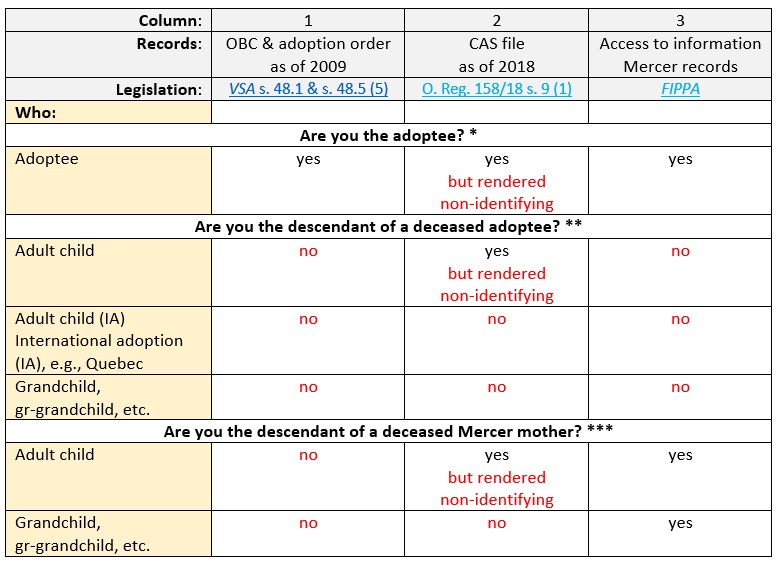
- * Adoptee can request Mercer records, only if knowledge of Mercer is acquired via OBC or CAS files, see column 1 and 2, but recall that the Mercer address was not recorded on the OBC during a certain time period. Nor is CAS necessarily releasing knowledge of Mercer in the file.
- **Descendant of a deceased adoptee, no access to Mercer records, even if they acquire knowledge of Mercer, as they don’t have the natural/birth mother’s name from column 1
- ***Descendant of a deceased Mercer mother, access to mother’s Mercer records only if knowledge of Mercer is acquired from column 2, which is only accessible to the adult child. Or, if knowledge of Mercer is acquired via family lore, census, or newspaper account, then Mercer records are accessible as they already know the mother’s name. In either case, no access to identifying info of a secret Mercer born baby who was adopted
The chart above does not indicate every possible scenario as it is based upon people who have contacted us for assistance. Most of those who contacted us already had knowledge of Mercer, via family lore, or a newspaper account; or as adoptees who acquired knowledge because they were born in the 1960s, when the Mercer address was recorded on an OBC.
Other issues and legislative barriers
- Adoptees have no legal right of access to their entire CAS file, nor a proper complaint and oversight service with the Information and Privacy Commissioner (IPC), unlike non-adopted people have as of January 1, 2020 under Part X of the CYFSA.
- Adoptees are denied access to their OBC if there is a veto which prohibits the disclosure of information under section 48.1 to the adopted person.
- If an adoptee has knowledge they were born of a criminalized mother considered a juvenile at the time of sentencing, a lengthy process is required to obtain a youth court order for access to juvenile records. Contact a youth court regarding the process of application. To locate a youth criminal court in Ontario click here.
- Descendants of a deceased Mercer baby of guardianship orders have been denied access to CAS records under Part X of the CYFSA, despite the transfer of care being pre-1921 Adoption Act.
- Adoptees are denied access to a deceased natural/birth parent’s birth certificate, as adoption legally severed the next of kin status. Thus, an adoptee’s identity, and search for ethnicity is denied, including the descendants of a deceased adoptee.
- Adoptees born of unwed mothers were deemed “illegitimate,” therefore, the father’s name was not recorded on the OBC, despite there being a provision allowing for it. One adoptee we know has a CAS file stating an oath of paternity was signed, yet the father’s name was redacted in the CAS file. (Research tip: contact Archives of Ontario, as court records pre-adoption are accessible)
- Adoptee discovers their natural/birth parent was involved with CAS as a child. Adoptees are denied access to their deceased natural/birth parent’s CAS file under Part X of the CYFSA, unlike non-adopted people who have a right of access.
- NEW ISSUES:
- O. Reg. 158/18 Adoption Information Disclosure allows for an extension of 90 days a per s. 9 (7). It has come to our attention some societies are using an extension in one full swoop and going beyond the 90 days by applying the 90 days after the first 30 days. Meaning they are applying a 120 day extension from the initial request.
Advocacy
Much work is required to achieve equality in relation to access to information for those who are affected by adoption versus people who were not adopted.
We made an attempt to resolve one of the legislative barriers and our group petitioned the Legislative Assembly of Ontario. Current legislation does not provide access to Post Adoption Birth Information (identifying information) to next of kin if an adult adopted person or a natural/birth parent is deceased in Ontario. The petition regarding adoption disclosure was tabled by MPP Monique Taylor on March 10, 2020. However, the Ministry refused to “extend access to Post Adoption Birth Information (identifying information) to next of kin, and/or extended next of kin, if an adult adopted person or a natural/birth parent is deceased.”
Below is the response to the petition tabled on March 10, 2020 and further communication.
- July 20, 2020 – Response to the petition tabled by MPP Taylor March 10, 2020
- September 21, 2020 – Monique Taylor, MPP to Minister Jill Dunlop
- October 24, 2020 – Response from Hon Jill Dunlop
UPDATE: On March 27, 2023 MPP Teresa Armstrong (London-Fanshawe) introduced Bill 87, Vital Statistics Amendment Act, 2023.
Click here to read the Bill and click here to watch the introduction of the Bill.
MPP Armstrong also read two statements prior to the introduction of the Bill, click here to watch.
To read the response from the petitions click here.
Please join us on Facebook at Extend Access to Post Adoption Birth Information, as we move forward in an attempt to move this Bill along.
Short Stories
Families of Criminalized and Incarcerated Women and Girls
In the past few years, families of incarcerated women and girls that have a connection to the Andrew Mercer Reformatory have been finding each other. We began an initiative in 2020 to extend access to post-adoption birth information, because one of our family members, despite Mercer being redacted in the Children’s Aid Society file, knew through family lore her deceased adopted mixed-race father was born in jail. We quickly realized a descendant of a deceased adoptee would never be able to request any jail or Mercer Reformatory records without their deceased adopted parents original birth registration containing their mother’s name. Recently, this descendant was able to circumvent the legislative barrier, as you will see in the first story below.
We found people who knew their ancestors were incarcerated at Mercer through family lore, newspaper accounts, or a census. Upon requesting Mercer records, they were shocked to learn their grandmother, or great-grandmothers delivered a baby while imprisoned that was later adopted. Horrified to learn of the tragedy of incarceration at the house of horrors, never mind learning they have a missing adopted relative, these descendants continue to seek answers in the hope that they will not only learn what happened to their ancestors’ missing babies, but also find peace and closure. Tragically, people were often never told they were adopted. Descendants wonder if these family members had a good life, did they know they had siblings, did they even know they were born at Mercer?
Living adoptees who had knowledge that they were born at Mercer, often know because they were born after 1960 when the Mercer address was recorded on the original birth registration.
We hope at a later date to provide a more fulsome historical narrative from the descendants of these unfortunate imprisoned women and girls and their babies born at Mercer; including stories from the living adoptees born at Mercer; people born at Mercer but raised by a family member, and also the tragic stories of women and girls who died at Mercer.
Below are brief stories, of only some of our members outlining the importance of extending access to Post Adoption Birth Information (identifying information) to next of kin, if an adult adopted person or a natural/birth parent is deceased.
Mixed-Race Father Born at Mercer
We knew through family lore, our mixed-race father was born in jail in 1929, later adopted and taken to China. I am currently denied access to my deceased adopted father’s original birth registration which would contain his mother’s name. Without my unknown grandmother’s name from his birth registration, I was unable to obtain the Mercer Reformatory records.
Desperate for medical information, I applied for a Severe Medical Search and was approved, but the government was apparently unable to locate anyone. Recently and reluctantly, I submitted my saliva for DNA testing which led to the discovery of my deceased adopted father’s mother’s name. After all these years we now know his Caucasian mothers name and I was able to request Mercer records. Although, unfortunately DNA has not allowed me to ascertain who his Chinese father was. This means my full paternal identity is still incomplete without access to my father’s original birth registration.
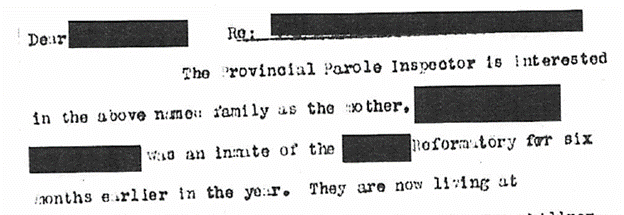
Our deceased adopted parent’s carceral birth history, and his full birth identity, in turn my full identity, should not be a secret!
~ Descendant of a deceased adoptee
Adoptee Whose Father was also Adopted
My name is Cat King, and I am an Ontario adoptee of the Sixties Scoop. My father was born at the notorious Andrew Mercer Reformatory in 1951 and later adopted himself. Had I not reunited with my father, I would never have known of my Indigenous ancestry.
When I had requested my Children’s Aid Society (CAS) file, there was absolutely no mention of my true heritage. Thankfully, my bio father was still alive to pass on this hidden information to me.
Not everyone will be as fortunate in finding a living relative.
Therefore, it is time for Ontario to Extend Access to Post Adoption Birth Information (identifying information) to next of kin, and/or extended next of kin, if an adult adopted person or a natural/birth parent is deceased.

~ Cat King, Sixties Scoop Adoptee
A Prison Gate to my Full Identity
On my maternal side, my grandmother (1936 – 2021) was adopted and a residential school survivor, and recently died in Edmonton, Alberta. In 1995 she learned of her Metis Heritage before her passing. In turn, this knowledge has been passed down to me.
However, here in Ontario my adopted father is deceased which prevents me from exploring my full identity on the paternal side.
I’ve known my father and one of his siblings were adopted together, and would later learn another sibling was adopted by a different family. I only recently learned his adoption was a result of his mother being imprisoned on Vagrancy charges at the Mercer Reformatory in Toronto, Ontario.
As a descendant of a deceased adoptee, I am currently denied access to my own father’s original birth certificate before his adoption, thus restricting me from my full paternal identity. Was there a father listed on his birth registration?

~ Lisa Auger, descendant of a deceased adoptee
Sentenced to the Good Shepherd
Since my father’s adoption was a kinship, I was fortunate to have his mother’s name and was able to request Mercer records. When the Mercer records arrived, I was shocked to learn, the sister of my father’s mother had the Children’s Aid Society (CAS) investigate the home for so called child neglect and then dragged her into court. The judge remanded the case for 30 days in the care and custody of CAS stating “there hasn’t been any proof of immorality.” CAS was to monitor the home and her, then provide a report.
My grandmother appeared again in 30 days and once again remanded. The third time in court, now visibly pregnant she is sentenced to the Good Shepherd for being pregnant by a man not her husband. Her husband was in the service at that time and overseas and had written to her in 1941 stating he wanted a divorce.
My grandmother arrived at the Good Shepherd in 1943 six months pregnant but oddly was transferred to the Mercer Reformatory the following day. The Mercer records also had a letter from the adopted mother questioning the Mercer superintendent why she recorded the mother’s husband’s name on the birth registration when they knew she was now single and he was at war.
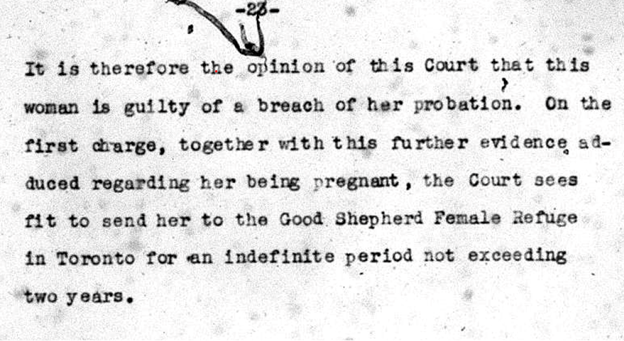
As a descendant of a deceased Mercer Baby with a Quebec adoption, unless Ontario legislation is modernized, I will be prevented from retrieving my own father’s original birth registration to examine for myself this wrongly recorded father’s name.
~Diana Vincelette and Trish Lisa Brennan Poff, descendants of a deceased adoptee
I Miss you Brother
I have been assisting my elderly father for over 25 years to find his brother who was involuntarily taken for adoption in 1943.
My grandmother became pregnant and was living in a boarding house. The boarding house said no children were allowed. She sought the help of the Children’s Aid Society (CAS). CAS turned her away unless she wanted the baby adopted.
She secured a place to board her child until she could secure funds/work. Running short of money, she became unable to pay to board the child. The woman boarding the child took the issue to the CAS. They swooped in, took the child and formally charged my grandmother with child neglect. The child became a ward of the court and put up for adoption.
My grandmother passed away before post adoption birth information (identifying information) was available to her (the parent). She had kept this horror to herself until just before her death, when she announced to my father that he had a brother. After explaining to him what took place. She made him promise to find his brother.
Since then, I have been searching for him. I have not calculated what it has cost so far both monetarily and time over the last 25 years. I do know, had the province opened the files years ago, adoptees and their families would have been reunited without the immense cost and the pain of trying to locate their loved ones.
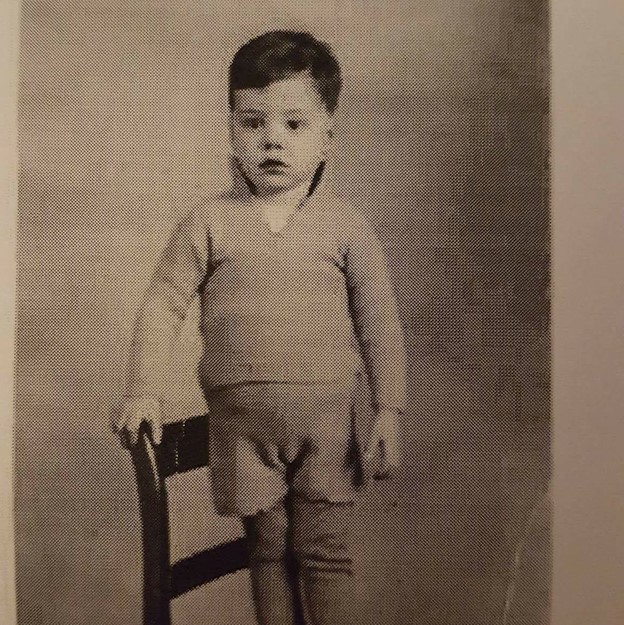
Now is time to Extend Access to Post Adoption Birth Information (identifying information) to next of kin, and/or extended next of kin, if an adult adopted person or a natural/birth parent is deceased.
See my personal search Facebook page by clicking here
~ Lisa Estall and her father, descendants of a deceased
natural/birth mother, a photo given to the mother from the Children’s Aid Society
“Was Incorrigible”
We are in touch with a descendant who was stunned to find her great-grandmother (a British Home Child) in a census incarcerated at the Mercer Reformatory. A family secret no doubt silenced by stigma and shame of incarceration. She was even more shocked to learn of her great-grandmother’s children she was not aware of.
It appears years prior to her criminalization there was a child secured by Children’s Aid Society (CAS) for adoption. The Mercer records also indicate her great-grandmother now had a toddler at the time she was sentenced to Mercer. This child was admitted to a “Home (Children’s Aid Shelter)” and was also adopted.
As she painstakingly continued to process the Mercer file it was revealed her great-grandmother was pregnant and transferred to the Burnside department at the General Hospital to deliver. The records further indicate she and the baby girl were returned to Mercer from the hospital to complete another year of her 18-month sentence for being “Incorrigible.”
In the Mercer file there was a dreadful application for her admission into an asylum, but it was not accepted. It is unclear when this application was made as there was no date on it. (More on asylum admissions by Theresa L. Raymond, M.A. thesis 2018, “Sex Cells: Women’s Paths to Institutionalization in the Hospital for the Insane, Cobourg, 1902-1935” available through York University)
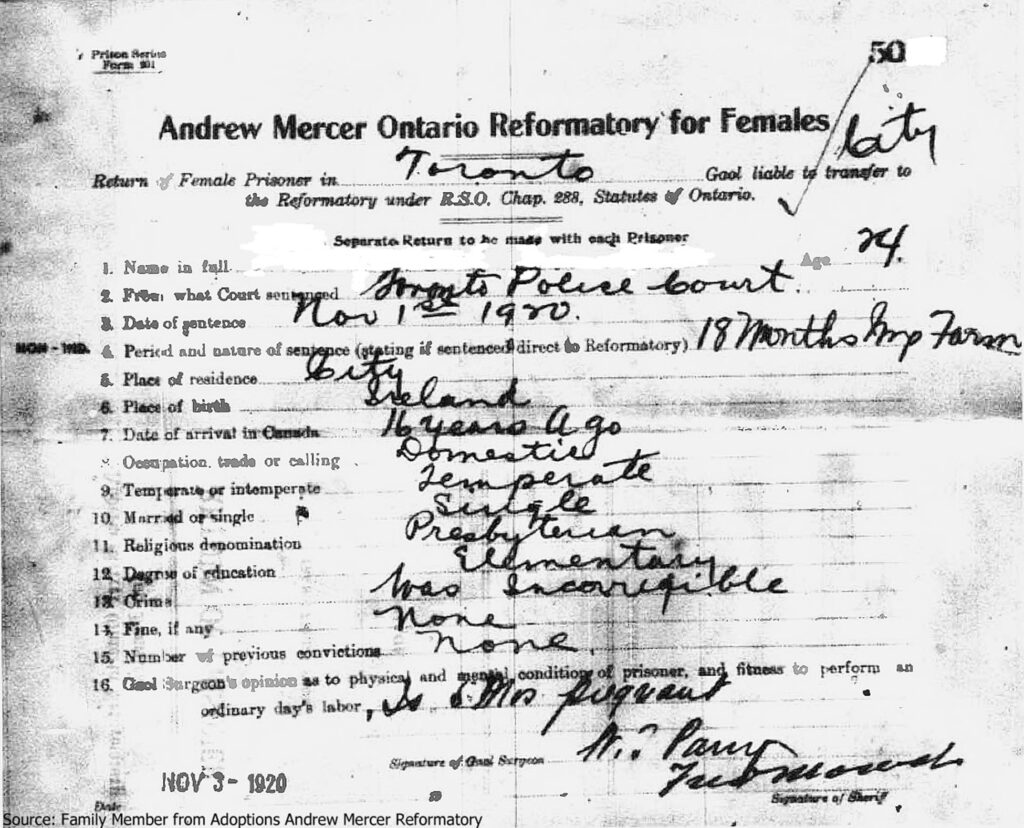
So, it gets worse since the insane application was not accepted! After taking care of her baby for a year at Mercer, just two weeks prior to her release J. J. Kelso, superintendent of Neglected and Dependent Children would send a letter to the Mercer superintendent instructing her “to take the child to Juvenile Court to have it committed to the Children’s Aid Society.”
We can only imagine how horrifying it was for her great-grandmother as an unwed mother having her babies involuntarily adopted. And for what she would have endured at the house of horrors. Obviously, this descendant and others are seeking answers to what really happened at Mercer and even more anxious to locate their missing ancestors’ children.
~ Anisa Copeland, descendant of a deceased natural/birth mother
Obscuring the Carceral Birth History on Birth Registrations
Over 20,000 women & girls were incarcerated at the Mercer Reformatory in Toronto, ON from 1880-1969. This figure does not account for those in other carceral institutions across Ontario, such as the Good Shepherd, Belmont Home, Industrial Schools, later called Ontario Training Schools (OTS), Women’s Jail Farm, or local jails. We are also extremely concerned about the criminalized Ontario Training School Girls (OTSG), and wards of a Children’s Aid Society (CAS) who were literally incarcerated in maternity homes, and for the girls sent to the OTS wing at Mercer.
What happened to the children of criminalized and imprisoned mothers and/or their babies born while incarcerated?
What we do know, in regards to Mercer, is that the carceral birth history has been obscured. The superintendent writes in the 1948 annual report, “…following the practice of many years, in each case the prospective mother was transferred to a general hospital, where her child was born; the fact of the mother’s being a prisoner was not in any way indicated in the registration of birth certificate.”
Mercer Address NOT Recorded on a Birth Registration
Founder Faith Lambert of the criminalized and incarcerated project is deeply concerned the institutional address of the Andrew Mercer Reformatory has been obscured from the birth registrations of babies born of incarcerated mothers. The partial image below is her birth registration acquired in May of 2011 listing her natural/birth mother’s address as 137 Cathcart St. with absolutely no indication she was born of an incarcerated mother.
She later applied for her Children’s Aid Society (CAS) records and waited several years for her request to be fulfilled. After repeated calls to CAS for an update she was always informed she was on the list to receive her records. Eventually she learned if she had a physician note prioritizing her request for records it would then move her request up. After she secured a note to prioritize her request, she finally received her CAS records in 2018. It was only at this time she learned she was born of a criminalized and incarcerated mother at the Mercer Reformatory. Although, as you will read in the example below, knowledge of being born of an incarcerated mother at Mercer is not necessarily disclosed in all Children’s Aid Society records.
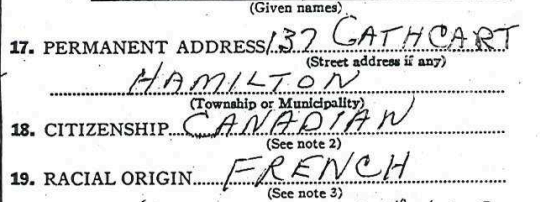
Mercer Address Recorded on Birth Registration in the 60s
An adoptee born in the late 1960s reached out to us. Her story began shortly after her adoptive parents passed, when she requested her Children’s Aid Society (CAS) file, along with her original birth certificate. She read her CAS file in earnest and began to wonder about the address on her birth certificate. After discovering 1155 King W, Toronto was the address of the Mercer Reformatory, she scoured her CAS file looking for any indication of Mercer. There was absolutely no mention of Mercer in her CAS file! Had she been born during the time the Mercer address was not recorded on a birth registration, as was the case of Faith Lambert’s birth registration noted above, this adoptee would never have discovered she was born of an incarcerated mother.


